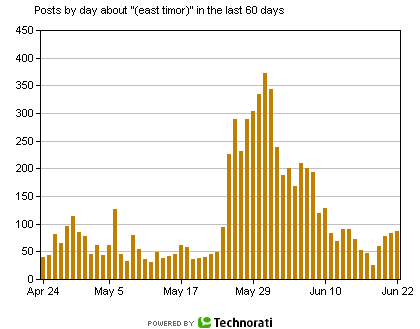There was a time a few days ago when I honestly thought that Timor-Leste’s election this week (to replace Xanana Gusmao) would be straightforward, just because it’s for a symbolic position with limited real power.
I’ve seen a few reports claiming that voters were rebuking Fretilin, the party formed from the revolutionary group that fought Indonesia for decades. More reliable sources, though, are saying the result is a show of support for the now-independent José Ramos-Horta in Dili, and for Lu’Olu (Fretilin’s man) everywhere else in the country. Since no one has a 50% majority, there’ll be a run-off election in May.
Although there’s street-level calm, the election has turned somewhat scandalous, with various accusations of unfairness being flung in pretty much every direction. The electoral officials, though, seem to think that any resulting error is insignificant.
If supporters of the five presidential candidates who dropped out go for Lu’Olu rather than Ramos-Horta, I wonder what effects that’ll have for Timor-Leste’s relations with other Asian nations (specifically Indonesia)? If the opposite happens, I wonder what prospects remain for cooperation in government, given that Fretilin members (notably the ex-PM, Mari Alkatiri) have accused Gusmao and Ramos-Horta of spreading misinformation?
Either way, I sincerely hope that the lessons learned this time around will be applied to the parliamentary elections in June, by which time Gusmao will be leading a new party …
Update 13/4: There’s confirmation of problems in the count, albeit not as severe as has been alleged.




 Atom feed
Atom feed

